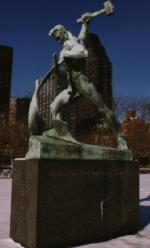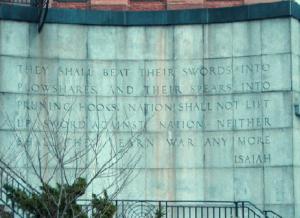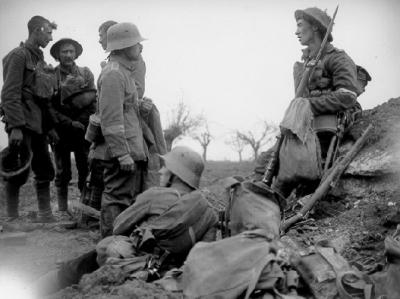One of the thoughts that is current at this time of year is the sentiment of Peace on earth and goodwill toward men. Its an ancient idea ... Read Isaiah 2:2-5
 Let Us Beat Our Swords Into Plowshares is a bronze sculpture created by Soviet artist Evgeny Vuchetich and presented to the United Nations in December 1959 by the Government of the USSR. The sculpture depicts the figure of a man holding a hammer aloft in one hand, and a sword in the other, which he is making into a ploughshare. It is meant to symbolize man's desire to put an end to war and to convert the means of destruction into creative tools for the benefit of mankind. The sculpture is located in the North Garden of UN Headquarters. Vuchetich imagined the sculpture, but the idea came from Isaiah. The inspiration for the sculpture is taken from Isaiah 2.
Let Us Beat Our Swords Into Plowshares is a bronze sculpture created by Soviet artist Evgeny Vuchetich and presented to the United Nations in December 1959 by the Government of the USSR. The sculpture depicts the figure of a man holding a hammer aloft in one hand, and a sword in the other, which he is making into a ploughshare. It is meant to symbolize man's desire to put an end to war and to convert the means of destruction into creative tools for the benefit of mankind. The sculpture is located in the North Garden of UN Headquarters. Vuchetich imagined the sculpture, but the idea came from Isaiah. The inspiration for the sculpture is taken from Isaiah 2.

The words of Isaiah 2 are inscribed in a wall across the street from the U.N. building. Its known as the Isaiah Wall in Ralph Bunche Park. For the last 32 years, visitors to and workers in the United Nations Building have walked in the presence of this word from the prophet. It enlightens them to the vision of a world without war. A time when all nations will be at peace ...
The Christmas Truce of 1914
 In the trenches on Christmas Eve of 1914, the soldiers of both sides became silent. In many locations throughout the no-mans land, the soldiers exchanged the sound of gunfire and shelling for Christmas carols. Soon they gave calls for a peace. And they emerged from their cold muddy ditches to greet one another. The men shared their provisions. They drank toasts and traded chocolates and cigars. They held communion services. In some places they even played a game of football.
In the trenches on Christmas Eve of 1914, the soldiers of both sides became silent. In many locations throughout the no-mans land, the soldiers exchanged the sound of gunfire and shelling for Christmas carols. Soon they gave calls for a peace. And they emerged from their cold muddy ditches to greet one another. The men shared their provisions. They drank toasts and traded chocolates and cigars. They held communion services. In some places they even played a game of football.
Some accounts say that the soldiers maintained the truce for over a week. But the politicians and high ranking officers viewed the truce as insubordination and threatened to shoot the soldiers if they did not return to war. Well, the officers and politicians had trained for war after all.
Isaiah would say that the soldiers were beating their swords into plowshares. He would say that the soldiers were calling each other to go to the mountain of the Lord. They were learning to walk in the light of the Lord. The last chapter of Stanley Weintraubs book Silent Night: The Story of the WWI Christmas Truce is entitled What If ? He sets out what he believes the rest of the 20th century would have been like if the soldiers had been able to cause the Christmas Truce of 1914 to stop the war at that point. There may have been no Russian Revolution, no Communism, no Lenin, and no Stalin, thus, no Cold War and no fear of nuclear annihilation. Furthermore, there probably would have been no Versailles Treaty, and therefore, no Hitler, no Nazism, no World War II. The dominos of world history would have fallen out very differently perhaps there would still be disputes, but a spirit of peace and unity would have brought into settling the disputes rather than a spirit of war. All this might have been if the soldiers had been able to beat every single sword into a plowshare.
But its just What If right? Sure. Why couldnt it be What If for today? Do we believe that any of this is truly possible?
The scale of the vision seems so large and grand. Nations are at peace. They are not going to war, but instead they are streaming into Gods house. The government and the Supreme Court are not in Washington, D.C. or New York City. No, in that day we are ruled from the spiritual Jerusalem, from Zion in other words, the throne of God. Disputes are taken before God himself and the judgment is good. Instead of learning new ways to kill and conquer, people are learning Gods ways. They are walking in Gods paths. It is a grand vision.
But it starts with people just people like us turning the swords and spears, the instruments of battle, into instruments of peace and prosperity. It starts with people like us, humbling ourselves enough that we will listen to what God has to teach us. It means that you and I will care about the things that Jesus taught us and treat it as a light that shows us the way.
It starts with people like us inviting one another to go up to Gods mountain. It starts with people like us inviting everyone to take a hike up Gods hill and sit down in Gods house and learn from him. It starts with people like us walking in Gods paths.
What makes the U.N. believe that peace is a possibility? What inspired Soviet Yevgeny Vucheitchs sculpture? What is it that calls people to pray and protest in front of the Isaiah Wall? A simple answer is that they have a hope an idea about a better future. Even if they cannot quite clarify it, they know that the future could be better than what we experience today.
Thats why we ought to be the people blazing the trail to that brighter tomorrow. Because we believe that the Day of the Lord is coming. Sadly, we are less able to express our hope than the people outside the house of God. Our expectation of the future is really quite thin and anemic. Its like a game show Who wants to go to heaven? Answer a few questions, and you win the prizes. And if that seems too self-serving we can simply say that we prefer heaven to the alternative. We are like Dante Allegheri we can tell a good story about hell and the Inferno, but our portrait of heaven and paradise is sort of dull.
This is no ones fault but our own. Scripture has given a vivid image of what we can expect. Heres what Isaiah saw: In the last days ... the mountain of the LORD's temple will be established as chief among the mountains; it will be raised above the hills, and all nations will stream to it.
And thats just a sample, thats just how it begins. Everyone is coming to Gods mountain. It is THE mountain. It is the place to be because God is there. Everyone is welcome. National borders, national economics, national heritage these things do not separate us. We are all on the same path heading up Gods mountain. We all have an audience with the Creator of the Universe. And he welcomes us.
Thats just how it begins. Since we are all heading to the same place and devoted to the same God, there is peace. No bombing, no shooting, no crossing of swords, not even the shout of angry and bitter words.
Whats our vision of that day? Have we heard the prophets? Have we heard the apostles? The apostle Peter knew what to expect. He regarded the vision of the last days as a call. God was making a promise and calling us to anticipate that promise being kept: we are looking forward to a new heaven and a new earth, where righteousness dwells. (2 Peter 3:13) In the day when the mountain of the Lord is the center of the universe, we will be living in the place where righteousness is the norm. Thats heaven, thats hope.
Are we stumbling in the dark? We are when we are blinded by silver and gold. When we worship fashion. When the object of our worship is not God, but the facts and logic of our study about God. We trust in what we know rather than trust in the God who knows us. Being so blind and arrogant, we do not climb the step to the house of God. But, we descend into the trenches of conflict, bitterness, and war. We beat our plowshares back into swords and we exchange wounds rather than gifts. Thats stumbling in the dark ...
So listen up. If weve been blinded then listen for the sound of singing. Listen to the ring of the hammer on the anvil. Were doing away with our weapons. We are working for peace. Lets go to school. Lets learn how to live with one another. Lets go to Christs house, up on the mountain everyone is going there. Disputes will be settled there. Conflicts will be resolved. Come on, were the house of Jesus Christ, so Come on - lets walk in the light of the Lord!
 Link to next sermon
Link to next sermon
 Link to other sermons of Chris Benjamin
Link to other sermons of Chris Benjamin